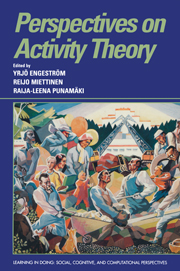Book contents
- Frontmatter
- Contents
- List of contributors
- Series foreword
- Introduction
- Part I Theoretical issues
- Part II Language and its acquisition
- Part III Play, learning, and instruction
- Part IV Technology and work
- Part V Therapy and addiction
- 24 Object relations theory and activity theory: A proposed link by way of the procedural sequence model
- 25 The concept of sign in the work of Vygotsky, Winnicott, and Bakhtin: Further integration of object relations theory and activity theory
- 26 From addiction to self-governance
- Author index
- Subject index
25 - The concept of sign in the work of Vygotsky, Winnicott, and Bakhtin: Further integration of object relations theory and activity theory
Published online by Cambridge University Press: 05 June 2012
- Frontmatter
- Contents
- List of contributors
- Series foreword
- Introduction
- Part I Theoretical issues
- Part II Language and its acquisition
- Part III Play, learning, and instruction
- Part IV Technology and work
- Part V Therapy and addiction
- 24 Object relations theory and activity theory: A proposed link by way of the procedural sequence model
- 25 The concept of sign in the work of Vygotsky, Winnicott, and Bakhtin: Further integration of object relations theory and activity theory
- 26 From addiction to self-governance
- Author index
- Subject index
Summary
Introduction
In his recent work, Ryle (Chapter 24, this volume) has introduced the idea of integrating object relations theory and activity theory. A specific aspect of this integrative perspective will be examined, implied in Ryle's work but not elaborated by him. It is the issue of sign mediation, Vygotsky's primary contribution to the methodological problems of modern psychology.
My aim is to show that object relations theory, especially the work of Winnicott, may bring fresh understanding to Vygotsky's early notions. I further claim that, by introducing the contribution of Mikhail Bakhtin and his circle to the notion of sign mediation, the profundity in Winnicott's understanding of the transitional object and of the potential space may be more fully appreciated. At the same time, Winnicott's and Bakhtin's ideas will jointly clarify limitations in Vygotsky's sign conception.
Ryle (Chapter 24, this volume) addresses the possibility of integrating object relations theory with activity theory by using the procedural sequence object relations model, developed by him in the context of an integrated approach to brief dynamic psychotherapy, the cognitive-analytic therapy (Ryle, 1982, 1990).
Ryle's attempt to transcend, by introducing activity theory, some of the limitations in a cognitivist understanding of mental functioning seems to open promising perspectives for examining the classical issue of the relations between psychoanalysis, psychology, and linguistics, addressed by Soviet psychologists in the 1920s (Voloshinov, 1976; Vygotsky, 1979). This early integration failed due to a number of limitations within both classical psychoanalysis and linguistics.
Information
- Type
- Chapter
- Information
- Perspectives on Activity Theory , pp. 419 - 434Publisher: Cambridge University PressPrint publication year: 1999
Accessibility standard: Unknown
- 9
- Cited by
